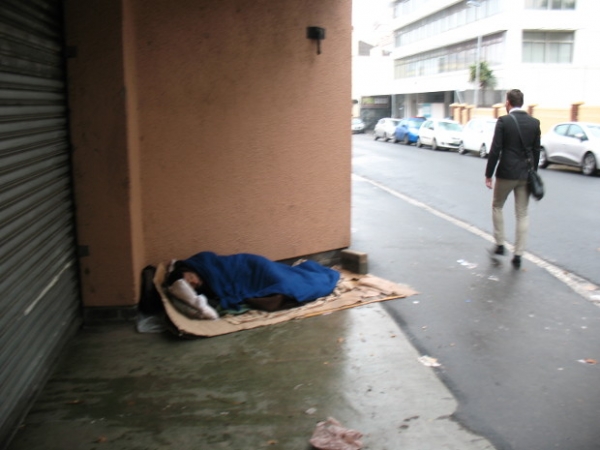“You were supposed to become somebody, - the hopes of homeless people

In the winter of 2014 I interviewed six young men who lived on the streets of Cape Town’s Central Business District.
How they had landed on the street differed in the details, but without exception their families had in some way become dysfunctional, either through the death of a primary care-giver or abuse at the hands of relatives. They spoke matter-of-factly, detachedly, of pasts which were almost unimaginably hard. Perhaps to delve too deep into these horrors was too painful; perhaps they had learnt that the past could do little but depress them; or perhaps the present was to them so difficult that it wholly occupied their attention.
And indeed their survival in the present was precarious and complex.
These young men were all at pains to distance themselves from the “tramps” of the streets, those people who had long ago given up hopes of working and leaving the street, who were content to subsist on the charity of others.
The men I interviewed spoke with a degree of contempt of these tramps, and emphasised the ways in which they were different: they still had hopes of leaving the street and capacity to imagine themselves in a life other than the one they were currently living.
“God didn’t make you to live on the streets,” Mallory told me. “You were supposed to become somebody.” The implication of his statement is that to be a street person is to be nobody. This idea was echoed by the other interviewees.
Louis, 27 years old, spoke of how beautiful women who passed him on the street refused to look at him. One of the first things he did when he saved enough money was to buy new clothes, in an attempt to shrug off the homeless identity made visible by his old, worn clothes.
He also said that his shabby appearance cost him jobs. One of his means of income was ringing the buzzers of Cape Town’s affluent homes and offering his labour as a gardener or handyman. People were often impressed by his voice, and came outside to meet him, but were immediately repelled by his appearance.
All the men I interviewed refused to beg or subsist on charity. One survival strategy several of them used was retrieving recyclable material from the green bins that line the CBD’s streets and taking these to the nearest depot. A full day of such work brought them between R7 and R14.
Louis recounted the dilemma he faces when he finds half-eaten food in the bins. He is starving and penniless, but to eat food out of bins would, he feels, would be to align himself with the tramps of the street.
The choice between appeasing hunger or retaining dignity is a choice that was faced by all of the men I interviewed. They told me that if you know the right places, you can find free meals at breakfast, lunch and supper times. But they opted instead to forego the free meals so they could spend their time searching for work, or doing what work they could find, even if the income they derived from such work could hardly buy a loaf of bread. Work offered them a means of identity beyond being homeless, and the potential to escape the streets one day.
These young men believed - and perhaps had to believe - that their situation was temporary. They would rather starve as they search for a means of becoming someone other than who they are than resign themselves to a life on the street.
Cowan is a Master’s student in Economic History at the University of Cape Town. Views expressed in this article do not necessarily reflect those of GroundUp.
Next: Four men charged with robbing Ethiopian shop
Previous: Old Mutual drags its heels on Khayelitsha housing development

This article is licensed under a Creative Commons Attribution-NoDerivatives 4.0 International License.


